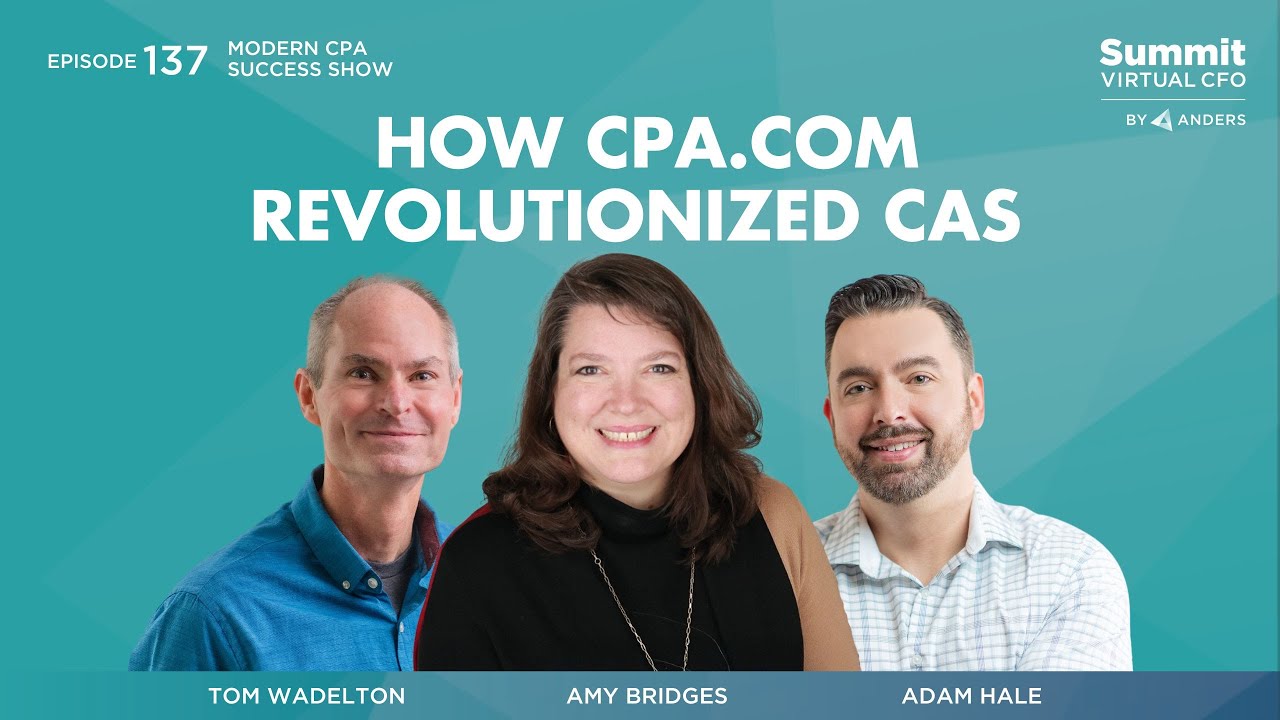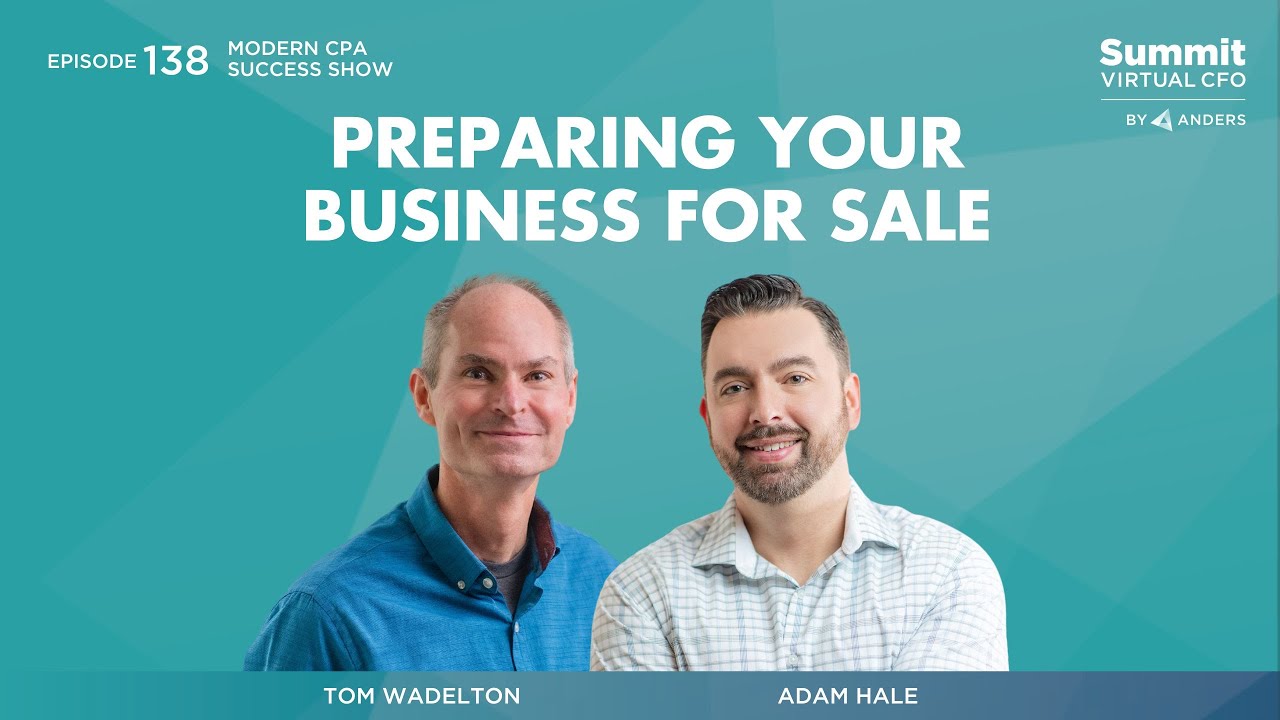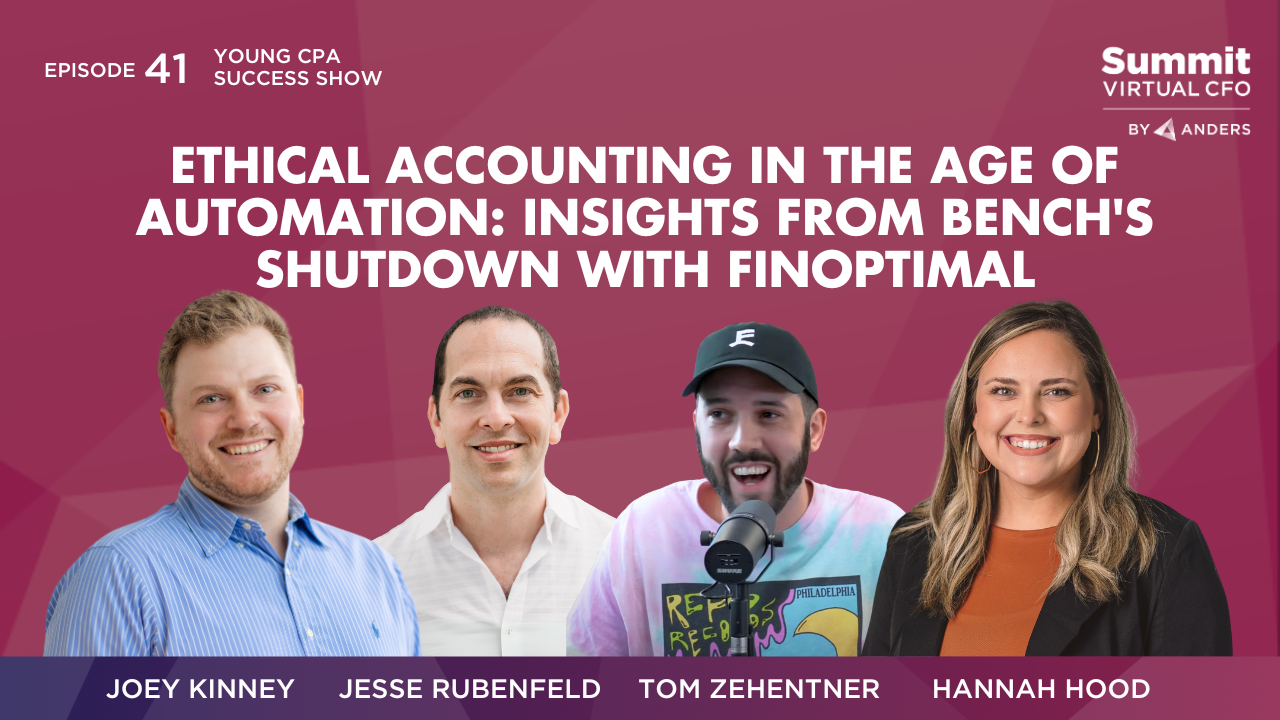The accounting industry is at an inflection point.
On the one hand, we’re facing a CPA shortage (the Society of Human Resource Management noted that, during the pandemic, 300,000 accountants left their jobs).
Yet at the same time, accounting trends are pointing to a bright future for the profession: From advancements in machine learning to a boom in remote work, accounting professionals have more opportunities than ever to have their cake and eat it too.
Here’s where we see the future of accounting heading.
Artificial Intelligence and Automation: Apocalypse or Revolution? 
“Will robots take our job?” Whenever a new technology appears on the horizon, it stokes the same fears.
“This AI stuff is real,” says Dave Hartley, Anders CPA Partner-in-Charge, Advisory, “It is going to have an impact. If you're not starting to prepare for that, it could be problematic.”
There’s a major silver lining, however: “When I came into the profession, I didn't necessarily get to do the most fun stuff,” Dave says. “But with AI a lot of that lower level work that nobody likes doing will be done by the technology.”
“If we think back about the technological advances we've had, from ledger paper, to punch cards, to mainframes, to PCs to cloud computing, it's created all these efficiencies that have allowed us to do more in less time,” says John Scott, who leads the Anders Virtual CFO practice for the legal industry.
“If we embrace AI and use it in the right way, it's the next revolution,” John says. “It's going to allow us to repurpose what people do, so they can do higher level work. If you think about the bots that will be employed to do things like data entry, then all of a sudden you free up capacity to do more advisory services for your client base.
Dave sums it up like this: “Put a set of financial statements into the tool and have it run all the ratios, do the analysis and come back to you with a top 10 list of these are things that you need to look at. Then a seasoned professional can look at that list of 10 and say, ‘Seven are red herrings, but these three are real issues that we need to deal with.’ If today you're going to analyze two sets of financial statements, imagine if you could get through six in a day.”
That reality means that those firms who decide to ignore automation may end up falling behind their competition, price-wise. As Kyle Geers, CEO and co-founder of Zeroed-In Consulting, says, “Firms that stick with the status quo and say, ‘Hey, let's get someone to spend eight hours on this’ — that’s not a sustainable business model.”
Relationships Above All: Soft Skills and Storytelling
Why would clients prefer a human over a bot that can process financial data in the blink of an eye?
Relationships. “The CPA profession has been and will continue to be relationship driven,” says Dave Hartley. “When we think about what differentiates us from the technology, it really comes down to: humans have relationships with other humans. There's a lot of things that tools can do that can help us, but at the end of the day, it's about that human relationship.”
That means that soft skills will become table stakes, says my podcast co-host Joey Kinney: “Young CPAs will have to work really hard storytelling, presentation, and building connections with coworkers and clients.”
It's natural for us to feel a little bit of fear when we think about AI and its potential. But AI it won’t replace human connection. As it automates more of the time-consuming, technical accounting functions, we're going to have to lean harder into our own internal skills and developing ourselves personally and professionally in ways that we probably haven't had to worry about before up to this point, which means we might need to invest in coaching, mentoring and networking more intentionally.
We’re also going to have to learn to communicate this value to our clients. In that context, storytelling coaching can be an invaluable investment: CPA thought leaders will need to explain things like dynamic cash flow forecasting — without using financial jargon.
“We struggle to articulate that thought, that intelligence, that wisdom that we bring to the discussion,” says Roger Knecht, President of Universal Accounting Center, “We're assuming that because it took me about a moment to think of the answer and five minutes to explain it, it is worth five minutes. In reality, that five minute explanation was ingenious as a tax strategy to help them save tens of thousands, if not hundreds of thousands or millions of dollars, was the result of your training, your study, your experience in the field. You're going to conferences, you're reading updates. All of these things culminate into that five minute answer. You need to give yourself credit where it's due, that you're a professional and you're deserving of that value.”
Bye, bye busy season, hello life-work balance?
Maybe, instead of heading straight for the accounting apocalypse, we can think of artificial intelligence and automation as a way to solve one of our industry’s biggest problems: busy season.
“If you can automate something, automate it,” Robert Minkler, Anders CPA Managing Partner says, reflecting on the future of the industry. If you are able to minimize mundane accounting tasks and streamline workflows for time-consuming accounting processes, you help employees work more efficiently. “When people plug in their brains at a higher level,” he adds, “They provide higher value for clients.”
Robert sees automation not just as an opportunity to work more efficiently but also to open the profession to people who may have otherwise struggled to accommodate busy season: CPAs won’t have to choose between their career and their personal obligations, which will allow for higher retention rates across the field.
For me, as a woman in the season of raising my kids, this resonates deeply: I stepped away from the industry because I couldn’t commit to busy season hours. If firms embrace automation, maybe the upcoming generation won’t be forced to make a choice between family and work.
Remote Work: The Globe’s the Limit
When Summit went fully distributed in the early 2010s, the concept of a remote CPA was pretty out there. It took the pandemic for the idea that your accountant doesn’t need to show up at the office, briefcase in hand, to go mainstream.
But today, according to a FlexJobs report, “accountant” is the number one most popular and searched for remote work job title.
That means accounting firms have more potential clients than ever, as outsourcing becomes a more common practice. As Dave Hartley reflects:
“Let's say you're in a small community, and you help a coffee shop figure out their KPIs, you figure out how to make them better make the owner's life better. How many other coffee shops are there in your town that you can serve? Three or four, maybe, but now think about what changed in the pandemic. Now you can serve any coffee shop, anywhere in the country. The vast majority of those folks are not financially oriented. They're trying to figure out how to run a coffee shop because they've got a passion for service or they really enjoy the coffee. That's our opportunity: suddenly you went from an addressable market of four to 400,000.”
It also means firms can attract the most diverse talent pool possible, assembling all-star accounting teams from across the country and even the globe. Remote work also opens the doors to people who might need or want something different from a traditional nine-to-five.
Dave Danic, Director of Tax Services at Summit Virtual CFO by Anders, experienced that challenge as his family was growing. Exhausted by 80-hour weeks plus a thirty-minute commute each way at a former position, he was able to spend more time with his growing family by switching to a remote position: “I've saved 60 days of my life of not sitting in the car and being with my family,” he says. “That could be an entire year over the course of a career.”
The Future of Accounting Is Here
“So much of the accounting profession has been focused in the past,” Dave Hartley says. “That's one of the major shifts: that's not what our clients want. Our clients want us to help them make better business decisions so that they can achieve their goals. That's what an advisor is, someone who helps look to the future. You have a skill set that's different than your client. You have a different perspective. You can help them make better decisions. They're not coming to us because it's a compliance thing, like they have a tax return or an audit. They're coming to us because they know we can make them better and more successful."
There is no crystal ball. The future of accounting is about real-time decision making, problem solving with our clients, serving that advisory role and traveling the road alongside them — in the present. It’s great to look ahead to the next goal, individually and as an industry. But while we’re setting our goals and looking to shape accounting tomorrow, let’s not forget accounting today.
For several decades, we’ve been working to change the way people think about accounting. We collected all of our insights in one community. Check out our community of firm owners below.
.png?width=120&height=77&name=Summit-Virtual-CFO_color_rgb%20(1).png)














